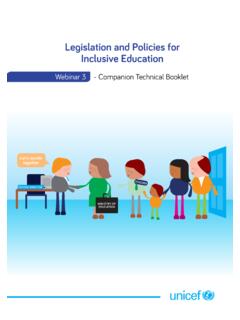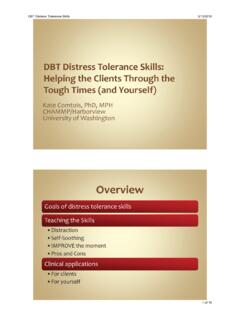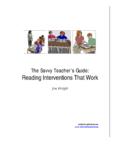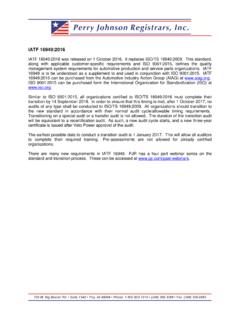Transcription of Parents, Family and Community Participation in Inclusive ...
1 Parents, Family and Community Participation in Inclusive education - Companion Technical BookletWebinar 13 United Nations Children s Fund (UNICEF) 2014 About the author: Sergio Meresman is an Inclusive development specialist, working in the areas of education , partnership building and Inclusive development. He is currently working in several initiatives aimed at engaging children, adolescents and young people with and without disabilities in support of Inclusive education with a focus on health education and sexuality education of children and adolescents with disabilities. Sergio is based in Montevideo (Uruguay) where he is the Project Coordinator of the Inter American Institute on Disability and Inclusive Development. He has been a consultant for the last 15 years, working with the Pan-American Health Organization (PAHO-WHO) and UNICEF in Africa and Latin America.
2 He holds a degree in Psychology from the University of Rosario (Argentina) and a Master s in Community Health from the School of Tropical Medicine at the University of Liverpool (England).Permission is required to reproduce any part of this publication. Permission will be freely granted to educational or non-profit organizations. Others will be requested to pay a small fee. Coordination: Paula Frederica HuntEditing: Stephen BoyleLayout: Camilla Thuve EtnanPlease contact: Division of Communication, UNICEF, Attn: Permissions, 3 United Nations Plaza, New York, NY 10017, USA, Tel: 1-212-326-7434; e-mail: major thanks to Australian Aid for its strong support to UNICEF and its counterparts and partners, who are committed to realizing the rights of children and persons with disabilities. The Rights, education and Protection partnership (REAP) is contributing to putting into action UNICEF s mandate to advocate for the protection of all children s rights and expand opportunities to reach their full , Family and Community Participation in Inclusive EducationWebinar BookletWhat this booklet can do for you 4 Acronyms and Abbreviations 6I.
3 Introduction 7II. Creating a Culture of Collaboration 8 Looking at Examples: The Cross-Sectoral Nature of Inclusive education ..10 III. How Can I Help? Understanding Different Levels of Collaboration and Partnerships 12 Looking at Examples: Parents as Activists in Contemporary Russia ..14IV. Starting from Scratch: Identifying Assets for Inclusion 16 Looking at Examples: Shaping a Deaf Identity ..17V. From Paper to Practice: Policies, Partners and Challenges 21 Looking at Examples: Parents and Family Organizations as Activists ..23VI. Moving Forward 25 Where to Start ..25 Additional Resources 29 Glossary of Terms 30 Bibliography 31 Endnotes 333 webinar 13 - Companion Technical BookletWhat this booklet can do for youThe purpose of this booklet and the accompanying webinar is to assist UNICEF staff and our partners to understand the importance of engaging with parents, families and communities in the process of implementing Inclusive education , with an emphasis on children with disabilities, and how it fits within UNICEF s this booklet you will be introduced to.
4 Why the Participation of parents and Community organizations is important in general for education and particularly significant in the case of children with disabilities and their families. Different approaches to engaging families and Community in support of inclusion and approaches to making it effective and meaningful for all parties. How to identify Family and Community assets that can assist the process of implementing Inclusive education on the ground. Examples of successful experiences in different regions of the world in which parents and social organizations have acted in support of Inclusive more detailed guidance on programming for Inclusive education , please review the following booklets included in this series:1. Conceptualizing Inclusive education and Contextualizing it within the UNICEF Mission 2.
5 Definition and Classification of Disability3. Legislation and Policies for Inclusive Education4. Collecting Data on Child Disability5. Mapping Children with Disabilities Out of School6. EMIS and Children with Disabilities7. Partnerships, Advocacy and Communication for Social Change8. Financing of Inclusive Education9. Inclusive Pre-School Programmes10. Access to School and the Learning Environment I Physical, Information and Communication11. Access to School and the Learning Environment II Universal Design for Learning12. Teachers, Inclusive , Child-Centred Teaching and Pedagogy13. Parents, Family and Community Participation in Inclusive education (this booklet)14. Planning, Monitoring and Evaluation4 webinar 13 - Companion Technical BookletHow to use this bookletThroughout this document you will find boxes summarizing key points from each section, offering case studies and recommending additional readings.
6 Keywords are highlighted in bold throughout the text and are included in a glossary at the end of the , at any time, you would like to go back to the beginning of this booklet, simply click on the sentence " webinar 13 - Companion Technical Booklet" at the top of each page, and you will be directed to the Table of access the companion webinar , just scan the QR 13 - Companion Technical BookletAcronyms and AbbreviationsABC Assistance for Blind ChildrenCBR Community -Based RehabilitatioCFS Child-Friendly SchoolsCRPD Convention on the Rights of Persons with DisabilitiesDPO Disabled Persons OrganizationsIE Inclusive EducationNGO Non-Governmental OrganizationsORS Oral Rehydration SaltsUN United NationsUNESCO United Nations education , Scientific and Cultural OrganizationUNICEF United Nations Children s Fund6 webinar 13 - Companion Technical BookletI.
7 IntroductionInclusive education is cross-sectoral and involves many different ministries and This booklet accompanies a webinar on Parent, Family and Community Participation in Inclusive education and complements a series of resources to support the capacity of UNICEF officers in the field. The webinar focuses on the challenges and opportunities for social Participation that arise from the Convention on the Rights of People with Disabilities (CRPD), the experiences of implementing Inclusive education worldwide and the need to embrace the post-2015 Development Goals with the collaboration of all stakeholders. Engaging parents and the Community is not a new concept. In fact, most of the approaches suggested will be familiar to UNICEF s staff and partners. Some may even be recognized as part of current practices and programmes.
8 Consequently, the ideas or suggestions for action presented are not meant to be used as isolated strategies, but rather to leverage existing programmes in the field. The Participation of families, social organizations of children with disabilities, Disabled Persons Organizations (DPOs) and Non-Governmental Organizations (NGOs) concerned with the rights of children in general or the rights of children with disabilities in particular will be examined here as tools that can benefit the goals of development, equity and the rights of all children through Inclusive are many examples of programmes, such as the UNICEF initiative Child-Friendly Schools, which have been for many years and still continue to be effective platforms for involving parents and communities. Such practices that are already institutionalized in many regions and countries can assist the development of new Inclusive education initiatives.
9 There are also examples of Family and Community involvement experiences within the initiatives that UNICEF and others have conducted for a number of years in the areas of Maternal and Child Health, Child Protection and Early Childhood Development. All these programmes can provide the basis for strengthening the relationship between children with disabilities and their schools, families and communities to create environments that are prepared to address diversity and stimulate the development and social inclusion of all 13 - Companion Technical BookletII. Creating a Culture of Collaboration Key Points Family involvement is important throughout the lifecycle of children with disabilities, especially in the early years (UNICEF, 2012). Involving parents and the Community is an important principle of quality, Inclusive education , both in and out of the classroom.
10 A positive connection between parents and schools influences children s attitudes and achievements in education . Families and civil-society organizations can also play an important role in the process of advancing a legal and policy framework for Inclusive education . Children with disabilities are not the only ones that benefit: there are also advantages for parents, classmates, educators and parents and the Community is an important principle of quality, both in and out of the classroom. It is even more relevant in the case of Inclusive education , which is much broader than formal education and should not only take place within the four walls of a collaboration is not only of benefit for children: there are also possible gains for all parties, for instance: Parents increase interaction with their children, become more responsive and sensitive to their needs and more confident in their parenting skills.









